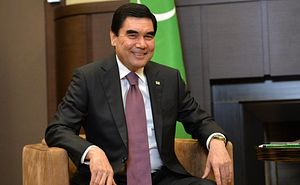As of January 1, 2019, Turkmenistan will cease providing free electricity, gas, drinking water and salt to its citizens, according to a recent decree signed by President Gurbanguly Berdimuhamedov.
The decree invalidates earlier legislative decisions — from 1992 and 2003 — which provided for the free supply of basic utilities, replacing them with a fee-based structure. According to RFE/RL, Berdimuhamedov said Turkmen would be given “preferential prices” but no numbers have been floated.
The new decree follows several years of talk and small steps toward rolling back subsidies which have provided Turkmen citizens with free electricity, gas, drinking water and salt since the 1990s. When Berdimuhamedov became president in 2007 after the death of Turkmenistan’s first president Saparmurat Niyazov, as a 2015 Jamestown article by Alexander Kim noted, Berdimuhamedov “maintained the subsidies but set maximum caps on free usage.” In the ensuing years, some caps were reduced or prices were raised for usage beyond an individual’s allotment. Kim wrote at the time:
Gradually, under Berdimuhamedov, the government started attempts to curb the subsidies. Over the past eight years, the price of gasoline has increased ten times, subsidies for flour and meat were reduced as early as 2012, monthly allocations of free electricity per person were reduced from 35 kWh to 25 kWh in 2013, free gasoline rations were removed entirely in 2014, while the price for natural gas increased to 20 manats ($7) per 1,000 cubic meters on consumption above the maximum allocated free amount of 50 cubic meters per person
Last year, the price of water beyond the standard free allotment was increased by a factor of 25. Reuters reported at the time that the price of tap water beyond the standard free allotment of 7.5 cubic meters per person was set to rise from 0.2 manat ( $0.06) to 5.0 manat (about $1.43) per 10 cubic meters. As Reuters wrote, “Householders in Turkmenistan will pay 25 times more for tap water.”
The rolling back of subsidies is cast by the authorities as part of developing a free market economy. The state’s narrative is that the subsidies are no longer necessary. Outside observers, however, see the end of subsidies as a desperate response by the state to difficult economic conditions. In this view, the subsidies are too great a burden for an already strained economy. Reality is likely somewhere in between.
“Under some estimates, the subsidies consume more than 22 percent of GDP in Turkmenistan,” Kim wrote back in 2015. If that figure is even remotely accurate today, that’s a significant chunk of money that will conceivably be freed up for other uses.
RFE/RL highlighted recurring reports about long lines for basic goods and shortages as a contrast to Berdimuhamedov’s comments about rising incomes and opportunities for Turkmen citizens.
Increasingly, there exist two versions of Turkmenistan: The state as its leaders describe it and the state as described in exile media and elsewhere. It will be critical to watch what happens when the subsidies are removed in full: Are Turkmen able to afford the basic goods they need to live? What does the state do for those unable to afford water or electricity? How will Turkmen households handle the shift? These are all good questions that will be difficult to answer given how hostile Ashgabat is toward journalists poking around in the country and describing the state as anything less than a utopia.

































